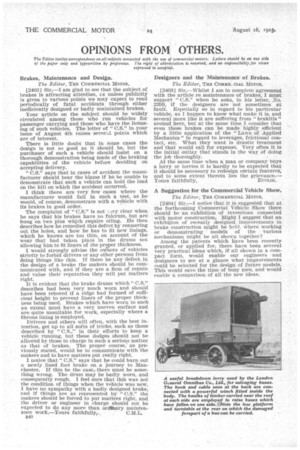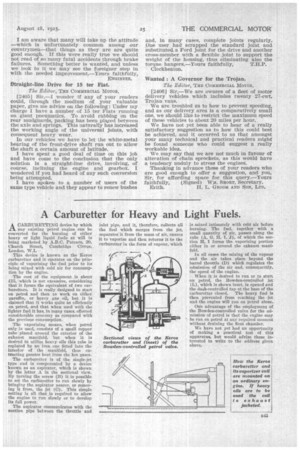OPINIONS FROM OTHERS.
Page 24

Page 25

If you've noticed an error in this article please click here to report it so we can fix it.
The Editor invites correspondence on all subjects connected with the use of commercial motors. Letters should be on one side of the paper only and typewritten by preference. The right of abbreviation is reserved, and no responsibility for views
expressed is accepted,
Brakes, Maintenance and Design.
The Editor, THE COMMERCIAL MOTOR.
[2402] Sir,—I am glad to see that the subject of brakes is attracting attention, as unless publicity is given to various points we may expect to read periodically of fatal accidents through either inefficiently designed or badly maintained brakes.
Your article on the subject should be widely circulated among those who run vehicles for passenger carrying and those who have the licensing of such vehicles. The letter of " C.S." in your issue of August 4th raises several points which are of interest.
There is little doubt that in some cases the design is not so good as it should be, but the purchaser of such a vehicle should insist on a thorough demonstration being made of the braking capabilities of the vehicle before deciding on accepting delivery.
" C.S." says that in cases of accident the manufacturer should bear the blame if he be unable to demonstrate that such a vehicle can hold the load on the hill on which the accident occurred.
I think there are very few cases where the manufacturer would fail in such a test, as he would, of course, demonstrate with a vehicle with its brakes in good order.
The complaint of " C.S." is not .try clear when he says that his brakes have no fulcrum, but are hung on two pins which require oiling. He then describes how he remedied this defect by reamering out the holes, and how he has to fit new linings, which he knows are too thin, on account of the wear that had taken place in the drums not allowing him to fit liners of the proper thickness. I would strongly advise the owners of vehicles strictly to forbid drivers or any other persons from doing things like this. If there be any defectin the design of a brake the makers should be communicated with, and if they are a firm of repute and value their reputation they will put matters right.
It is evident that the brake drums which " C.S." describes had been very much worn and should have been rebored if a ridge had formed of sufficient height to prevent liners of the proper thickness being used. Brakes which have worn to such an extent must have a very uneven surface and are quite unsuitable for work, especially where a fibrous lining is employed.
Drivers and others will often, with the best intention, get up to all soils of tricks, such as those described by " C.S.," in their efforts to keep a vehicle running, but these dodges should not be allowed by those in charge in such a serious matter as that of brakes. The proper course, as previously stated, would be to communicate with the makers and to have matters put really right.
I notice that " C.S." says that he could burn out a newly lined foot brake on a journey to Manchester. If this be the case,. there must be something wrong. The drum may be badly worn, and consequently rough. I feel sure that this was not the condition of things when the vehicle was new. I have no sympathy with a badly designed brake, and if things are as represented by " C.S." the makers should be forced to put matters right, and the driver or engineer in charge should not be expected to do any more than ordilhary mainten ance work.—Yours faithfully, C.M.L.
Designers and the Maintenance of Brakes.
The Editor, TELE COMME-OIAL MOTOR.
[2403] Sir,—Whilst I am in complete agreement with the article re maintenance of brakes, I must support " C.S." when he asks, in his letter, No. 2309, if the designers are not sometimes at fault. Especially so in regard to his particular vehicle, as I happen to know what make it is, and several more like it are suffering from " brakitis " around here, but at the same time I consider that even these brakes can be made highly efficient by a little application of the "Laws of Applied Mechanics" in regard to leverages, frictional contact, etc. What they want is drastic treatment and that would call for expense. Very often it is the initial outlay that stands in the way of doing the job thoroughly.
At the same time when a man or company buys a lorry or lorries it is hardly to be expected that it should be necessary to redesign certain features, and to some extent therein lies the grievance.— Yours faithfully, EUCLID.
A Suggestion for the Commercial Vehicle Show. The Editor, THE COMMERCIAL MOTOR, [2404] Sir,—I notice that it is suggested that at the forthcoming Commercial Vehicle Show there should be an exhibition of inventions connected with motor construction,. Might I suggest that an exhibition of recently designed improvements in brake construction might be held, where working or demonstrating models of the various mechanisms might be all shown together?
Among the patents which have been recently granted, or applied for-, there have been several very practical ideas which, if all shown in a compact• form, would enable our engineers and designers to see at a glance what improvements could be selected for the design of future models. This would save the time of busy men, and would enable a comparison of all the new ideas. am aware that many will take up the attitude —which is unfortunately common among our countrymen—that things as they are are quite good enough. If this were really true we should not read of so many fatal accidents through brake failures, Something better is wanted, and unless we look to it we may see the foreigner step in with the needed improvement. —Yours faithfully,
• ENGINEER,
etraight-line Drive for 15 ter Fiat.
The Editor, Tun COMMERCIAL MOTOR, [2405] Sir,—I wonder if any of your readers could, through the medium of your valuable paper, give me advice on the following: Under my Charge I have a number of 15 ter Pints running on giant pneumatics. To avoid rubbing on the rear mudguards, packing has been pla.ced between the axle and springs. This naturally has Increased the workino,l' angle of the universal joints, with consequent heavy wear.
In our vehicles we have to let the white-metal bearing of the front-drive shaft run out to allow the shaft a certain amount of latitude.
I have spent a good deal of time on this job and have come to the conclusion that the only solution is a straight-line drive, involving, of course, inclining the engine and gearbox. I wondered if you had heard of any such conversion being attempted.
have spoken to a number of users of the same type vehicle and they appear to renew bushes and, in many cases, complete joints regularly. One user had scrapped the standard joint and substituted-a Ford joint for the drive and another cross-member with a flexible joint to support the weight of the housing, thus eliminating also the torque hangers.—Yours faithfully, T.H.P. Cleckheaton.
Wanted : A Governor for the Trojan.
The Editor, TEE COMMERCIAL MOTOR, [2406] Sir,—We are owners of a fleet of motor delivery vehicles which includes twenty 27-cwt. Trojan vans.
We are troubled as to how to prevent speeding, and as our delivery area is a comparatively small one, we should like to restrict the maximum speed of these vehicles to about 20 miles per hour._ We have not yet been able to hear of a really satisfactory suggestion as to how this could best be achieved, and it occurred to us that amongst your many technical and practical readers might be found someone who could suggest u really workable idea.
We.may say that we are not much in favour of alteration of chain sprockets, as this would have a tendency unduly to stress the engines.
Thanking in advance those of your readers who are good enough to offer a suggestion, and you, Sir, for affording space for this query.--Yours faithfully, (Signed) WM. SHORT, Secretary, Erith. H. L. GROOM Al.%.11:1 SON, LTD,,




























